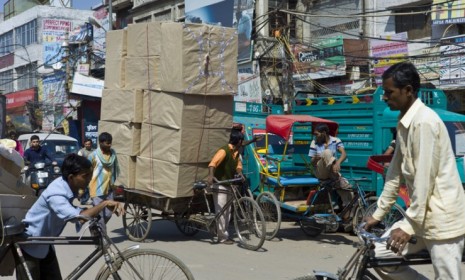Why India's booming economy is stalling: 3 theories
The country once seem destined to rival China as Asia's top economy. But India's success story has taken an unexpected plot twist

A free daily email with the biggest news stories of the day – and the best features from TheWeek.com
You are now subscribed
Your newsletter sign-up was successful
Beginning in the 1990s, India relaxed strict state controls over its economy, unleashing years of blistering growth. The country appeared to be on an upward trajectory that would lift millions out of poverty. With its thriving, boisterous democracy, India was poised to be an economic, moral, and political counterweight to China, the other great emerging economic power in Asia. But the starry optimism has abated. Economic growth slowed to 6 percent in the last quarter, barely enough to keep the gains of the past two decades. Here, three reasons India's rise has stalled:
1. Corruption
The government of Prime Minister Manmohan Singh has been implicated in a string of corruption scandals. Most recently, the government was accused of selling coal fields to politically connected conglomerates on the cheap, resulting in a loss of $210 billion for the government. Because of the graft, voters are getting ticked off, and the government is "losing credibility abroad," says Mamta Badkar at Business Insider. "Reports of corruption are only going to keep investors away," depriving India of much-needed capital.
The Week
Escape your echo chamber. Get the facts behind the news, plus analysis from multiple perspectives.

Sign up for The Week's Free Newsletters
From our morning news briefing to a weekly Good News Newsletter, get the best of The Week delivered directly to your inbox.
From our morning news briefing to a weekly Good News Newsletter, get the best of The Week delivered directly to your inbox.
2. Government interference
"Like a Bollywood villain who just refuses to die," the Indian government seems intent on pushing its way back into the economy, says The Economist. For example, Singh's government recently decided it wanted to "tax foreign takeovers retroactively," which will hit foreign companies in India with unexpected costs. The Indian government has also gone on a "borrowing binge" in recent years to pay for its social programs, which has "crowded out the private sector." Even newer industries that came of age in the 1990s, like the telecommunications sector, are now feeling the "clammy grip" of the bureaucracy.
3. Political paralysis
India's fractured political scene has made it nearly impossible for Singh's government to pass reforms that economists say are necessary to lift India to its next stage of development. For example, the government recently dropped a plan to allow Walmart and other retailers into the country. Experts said the move was vital to modernizing India's weak retail infrastructure, but a member of Singh's coalition pulled out at the last second. Singh's Congress party did poorly in recent state elections, indicating continued political paralysis and deepening a "sense of gloom among business leaders and others already frustrated by the government's inability to tackle crucial reforms," says Jim Yardley at The New York Times.
A free daily email with the biggest news stories of the day – and the best features from TheWeek.com
-
 The Week contest: Lubricant larceny
The Week contest: Lubricant larcenyPuzzles and Quizzes
-
 Can the UK take any more rain?
Can the UK take any more rain?Today’s Big Question An Atlantic jet stream is ‘stuck’ over British skies, leading to ‘biblical’ downpours and more than 40 consecutive days of rain in some areas
-
 The UK expands its Hong Kong visa scheme
The UK expands its Hong Kong visa schemeThe Explainer Around 26,000 additional arrivals expected in the UK as government widens eligibility in response to crackdown on rights in former colony